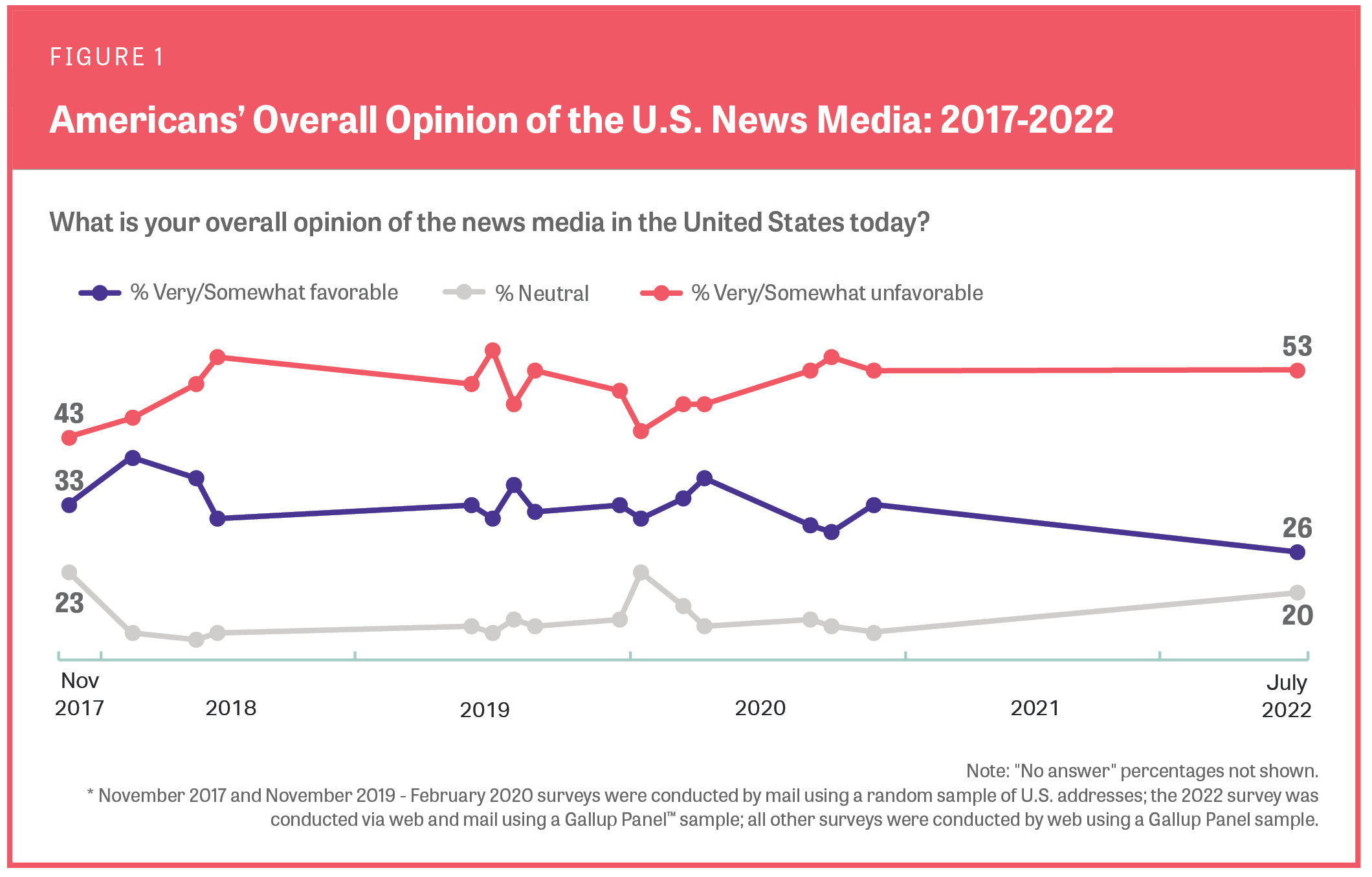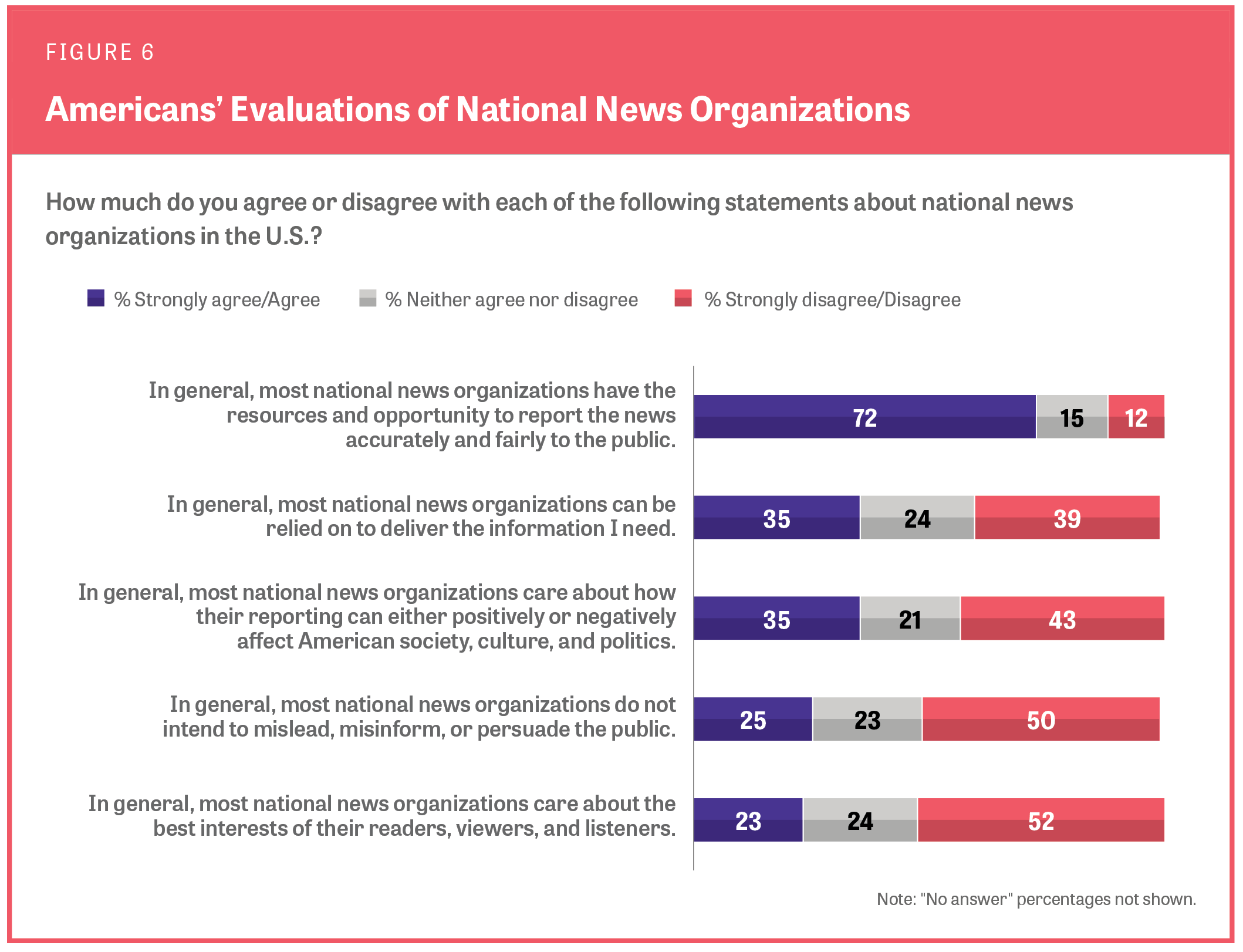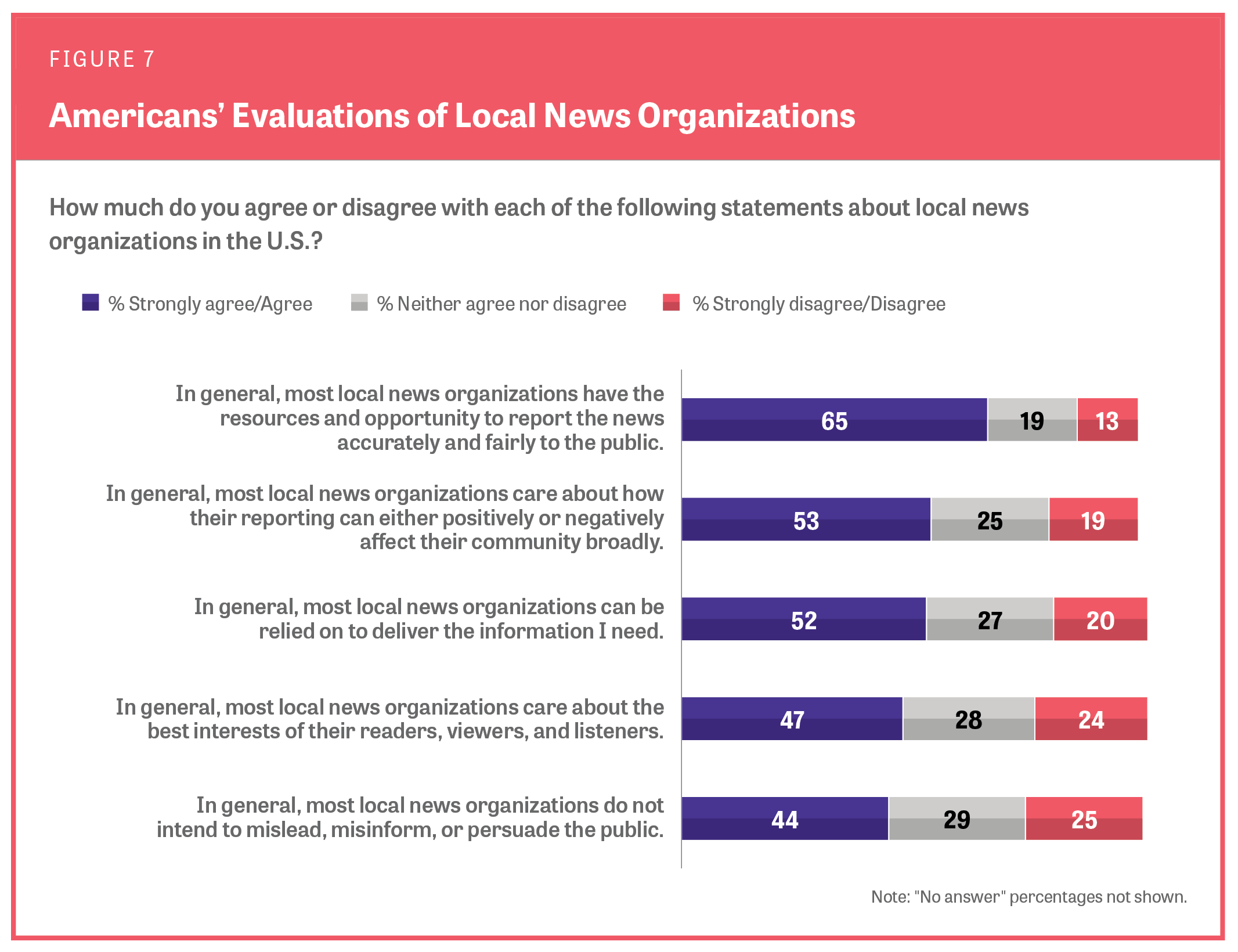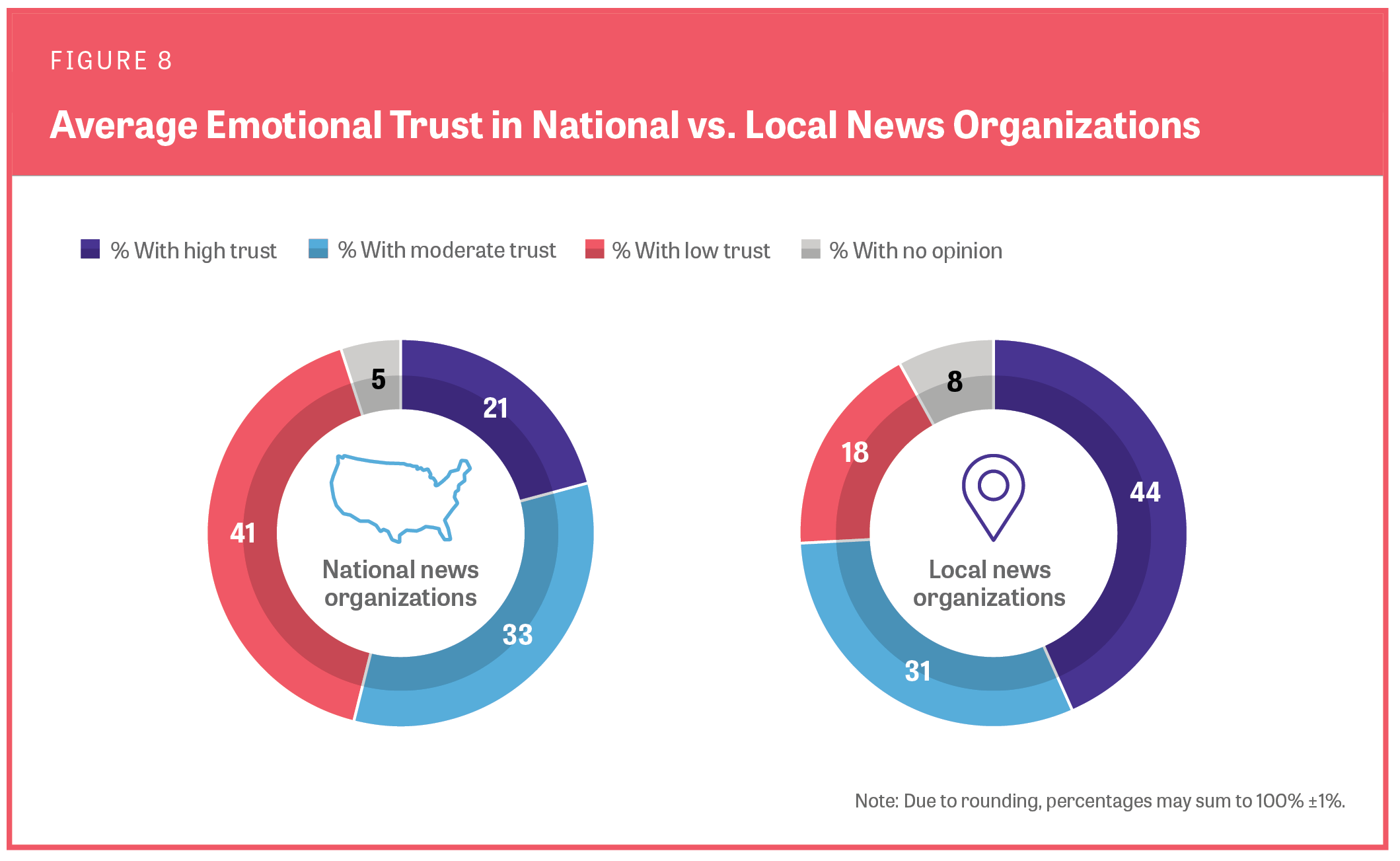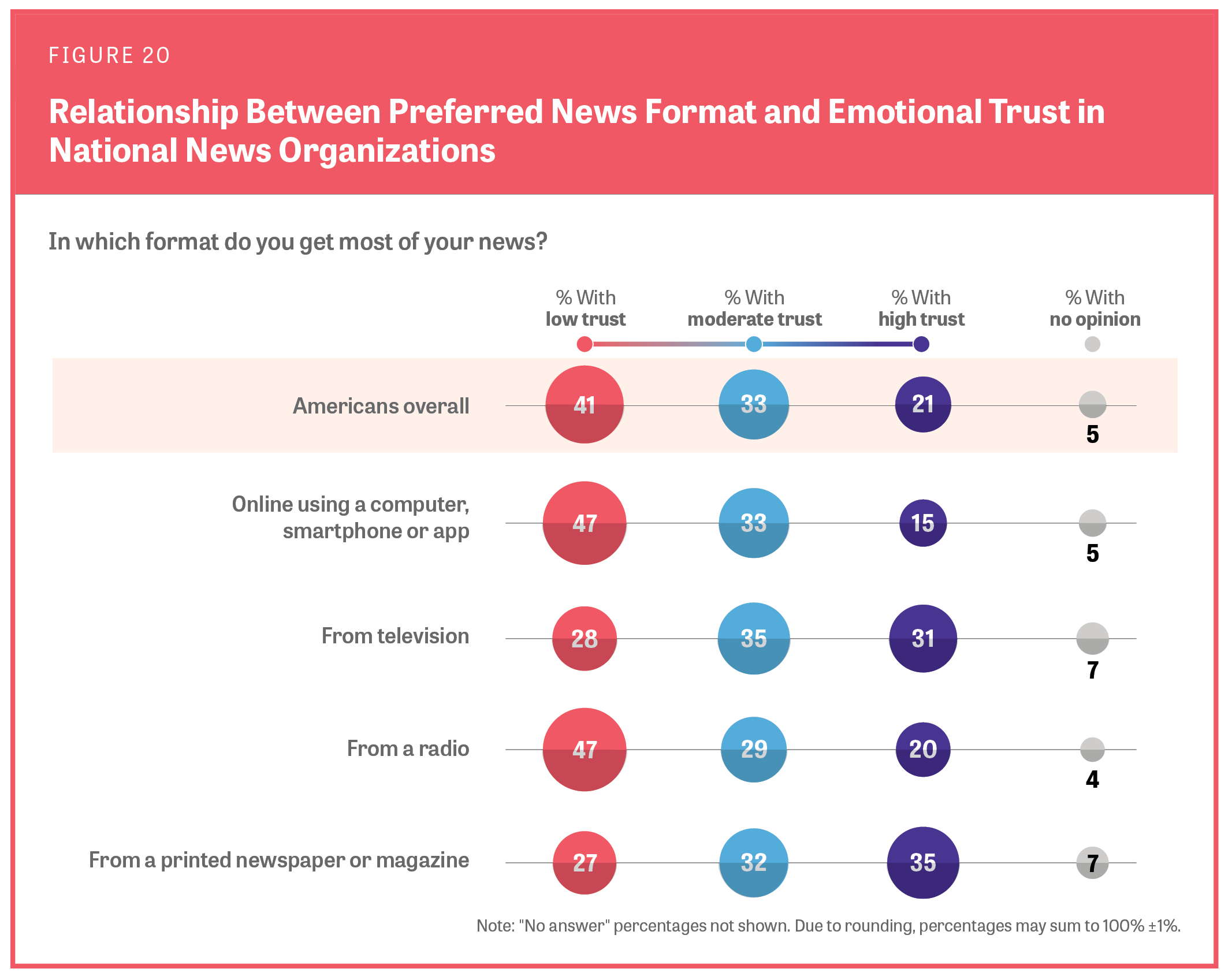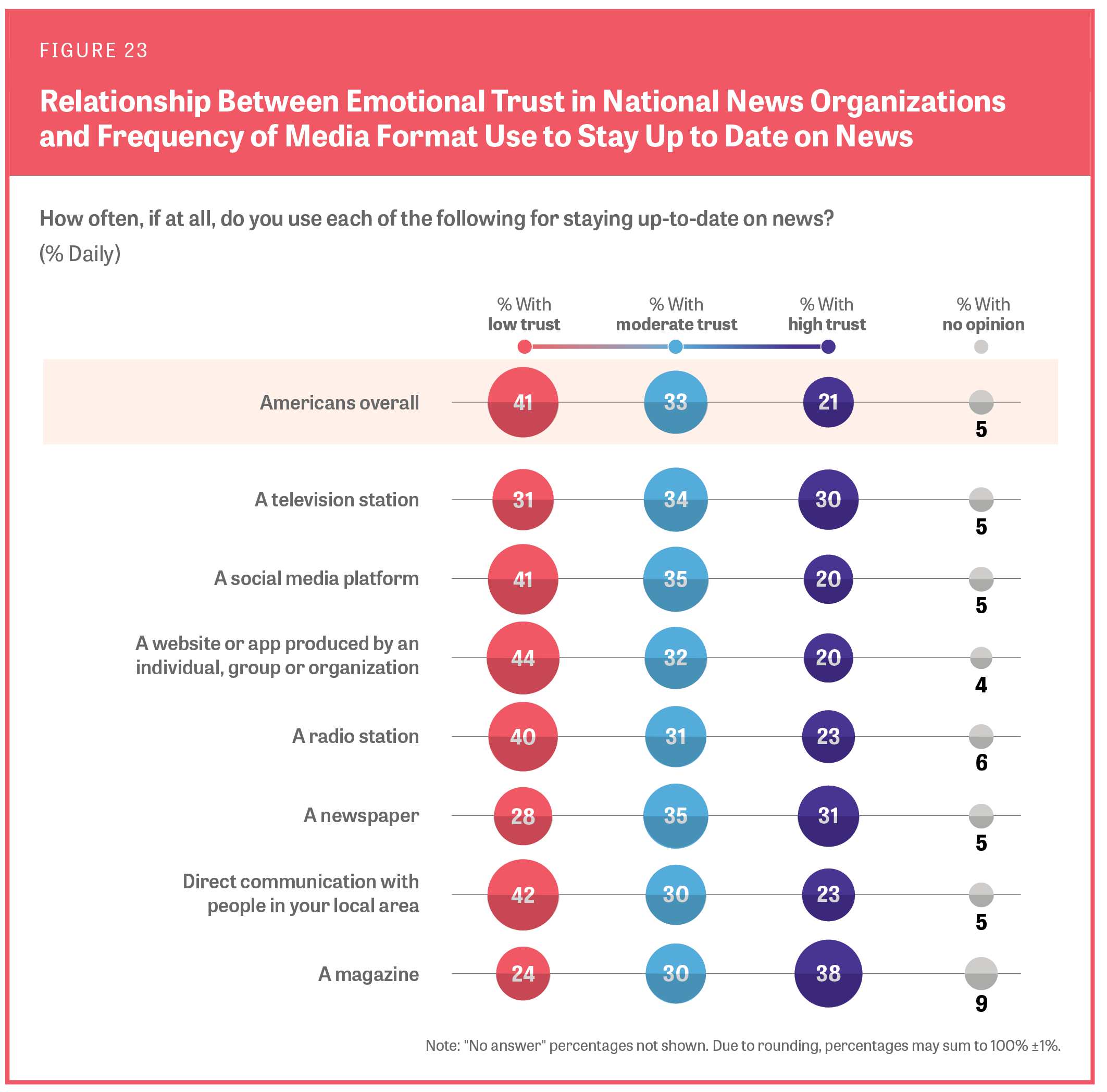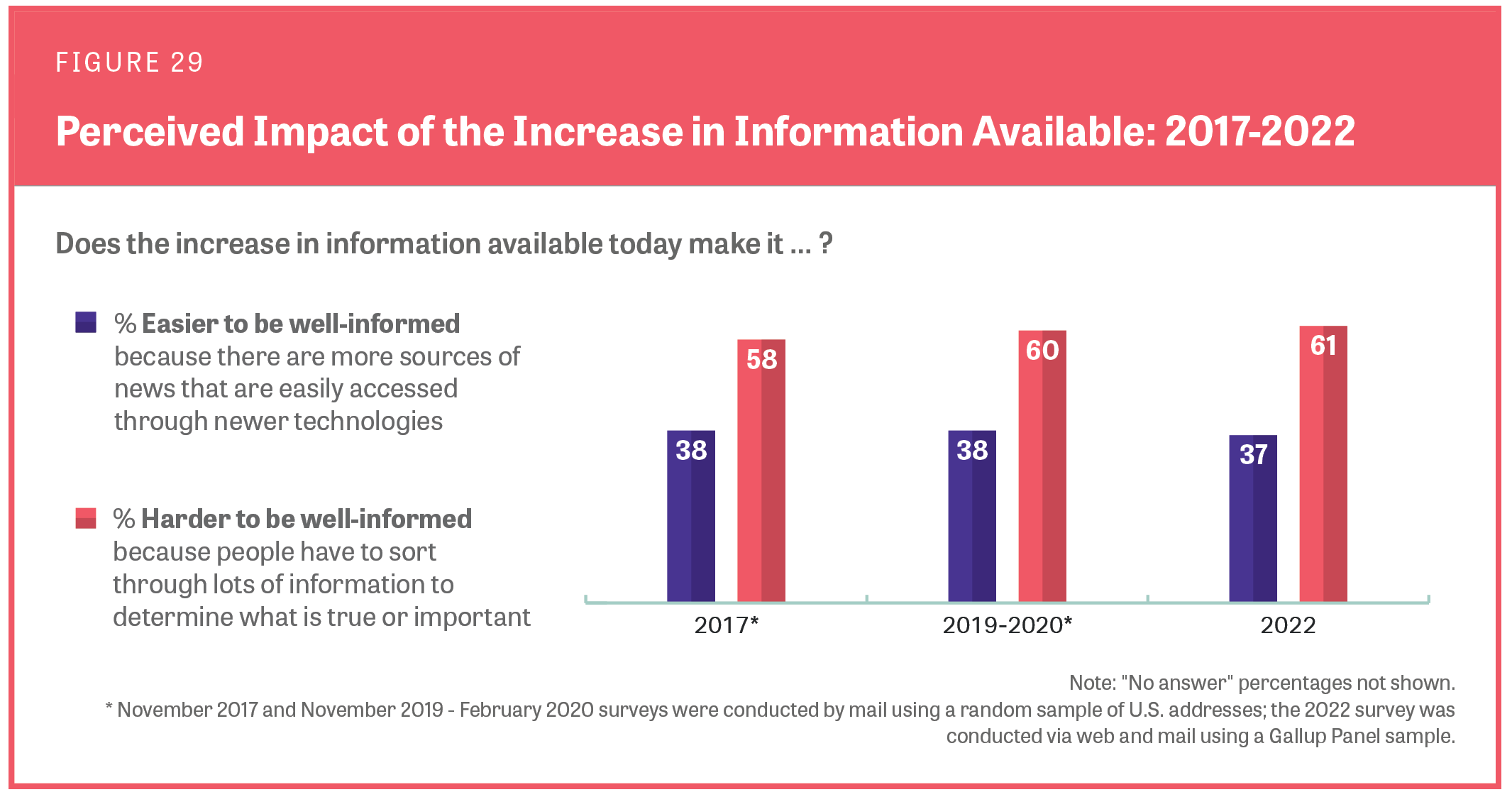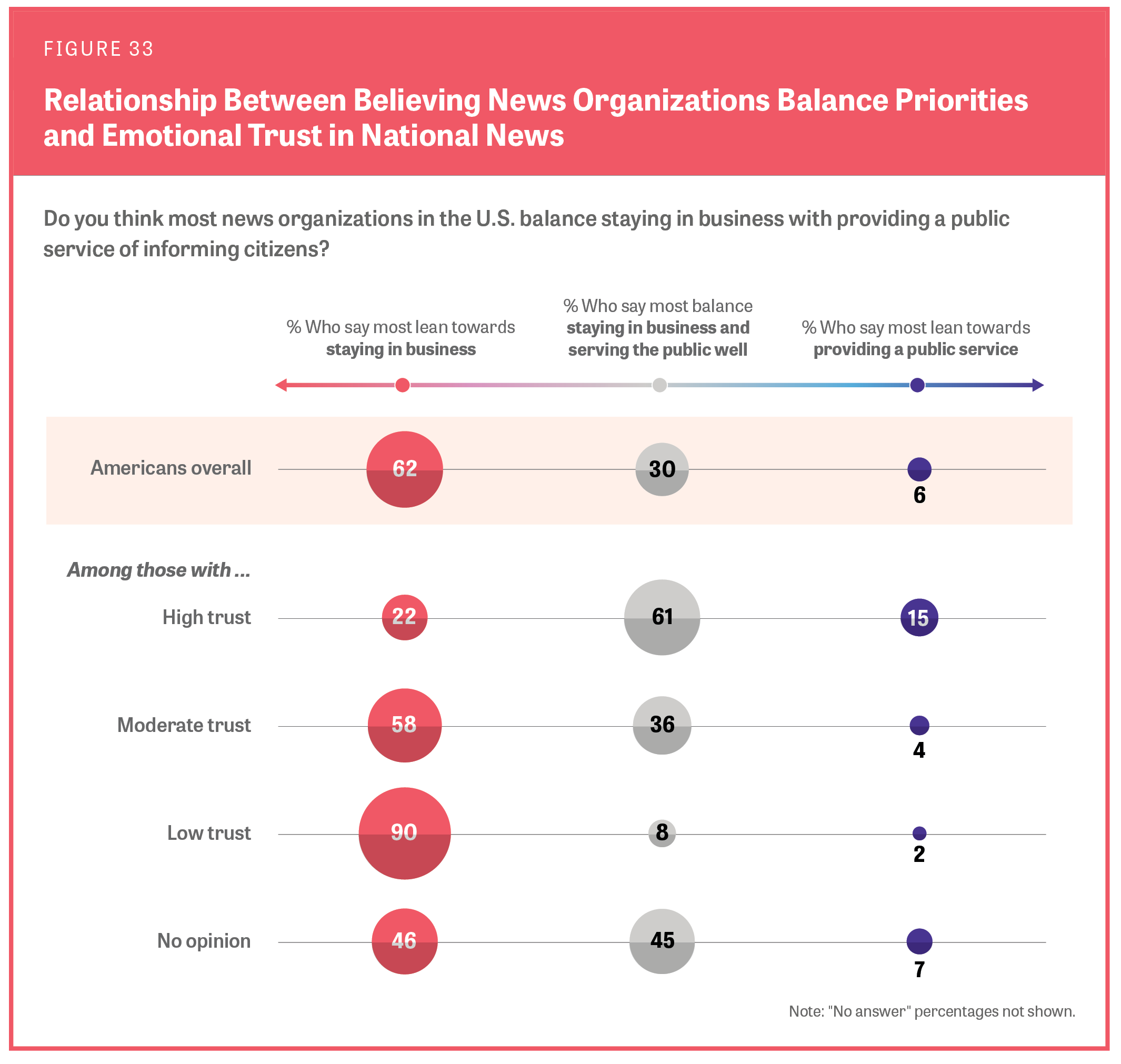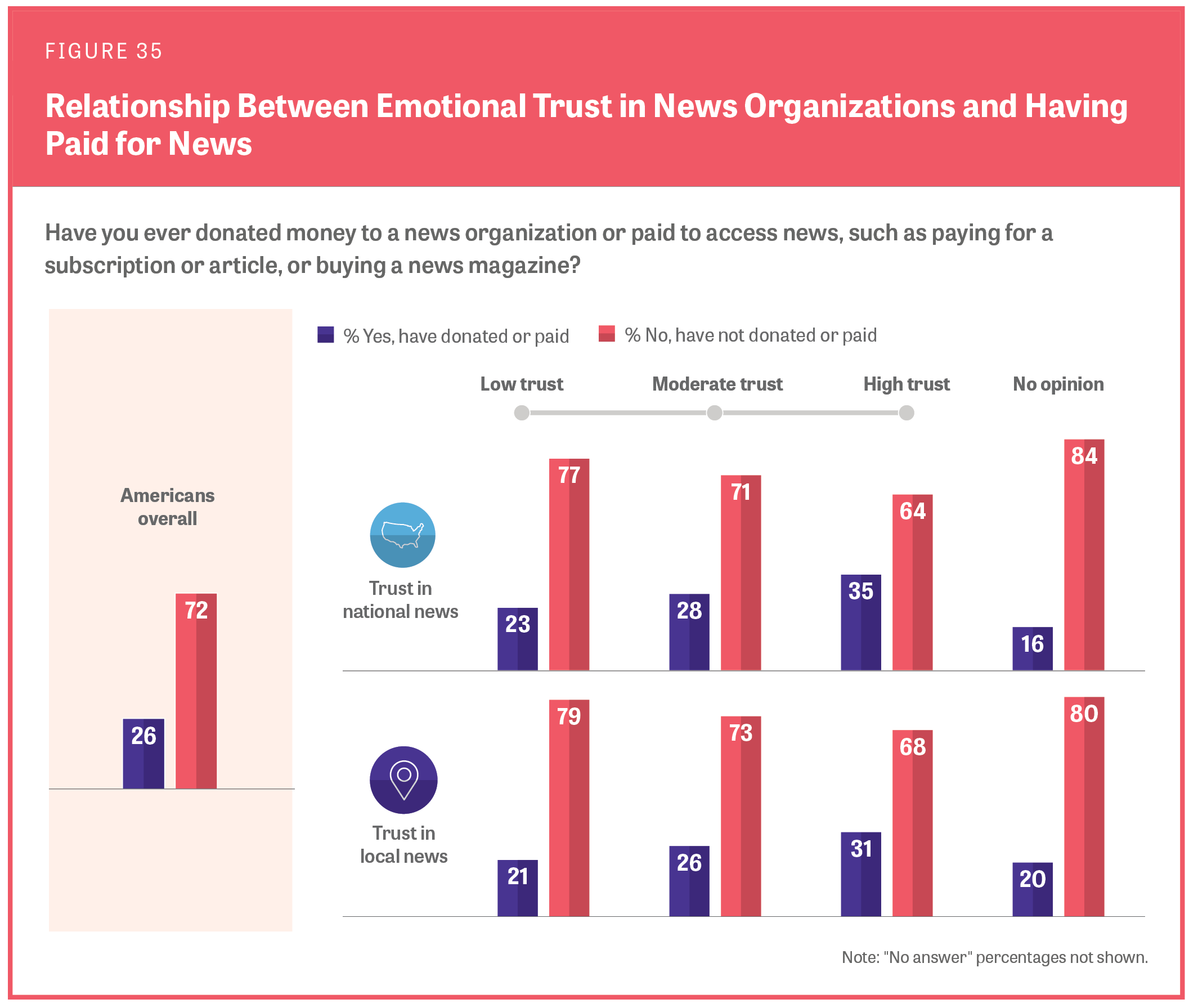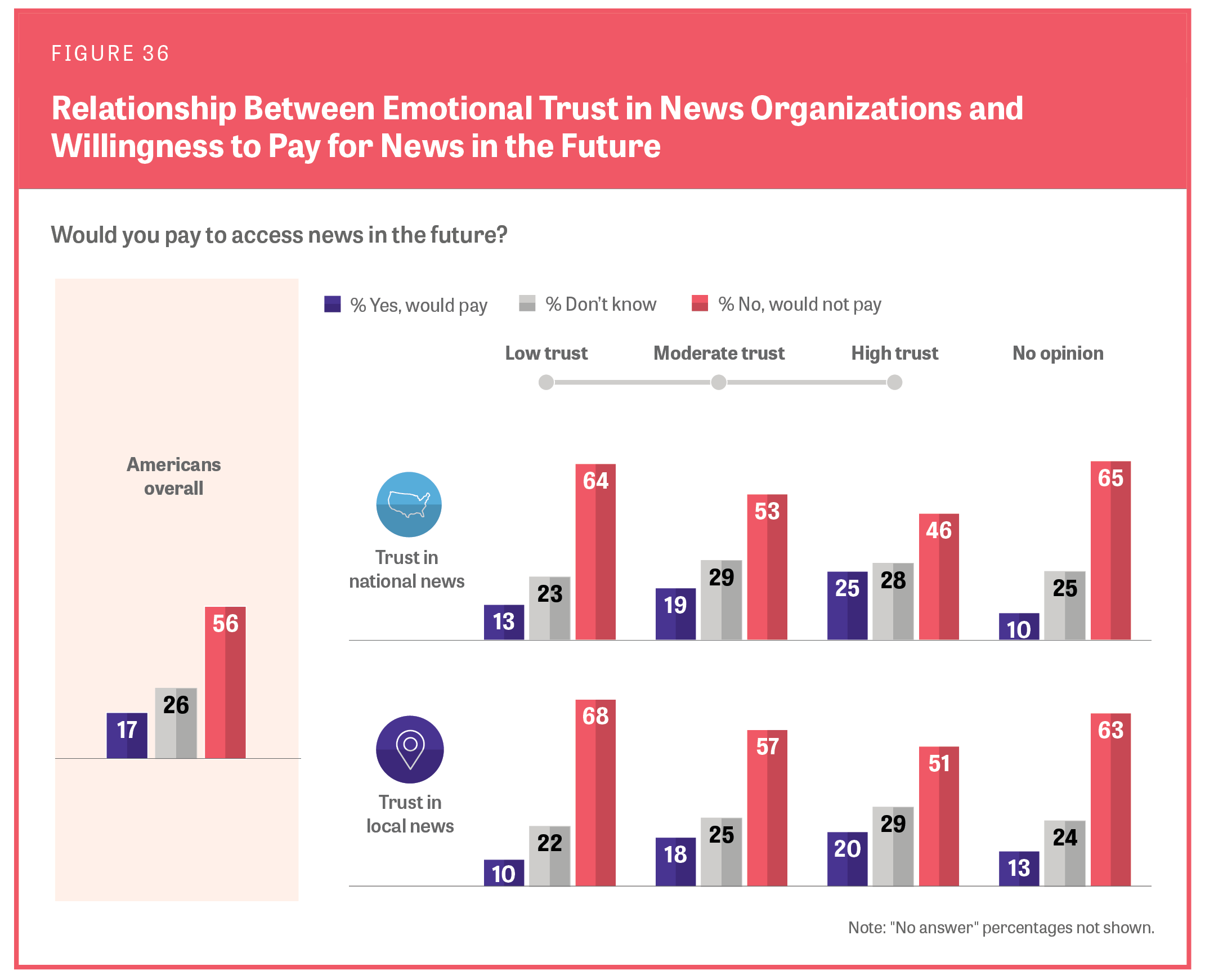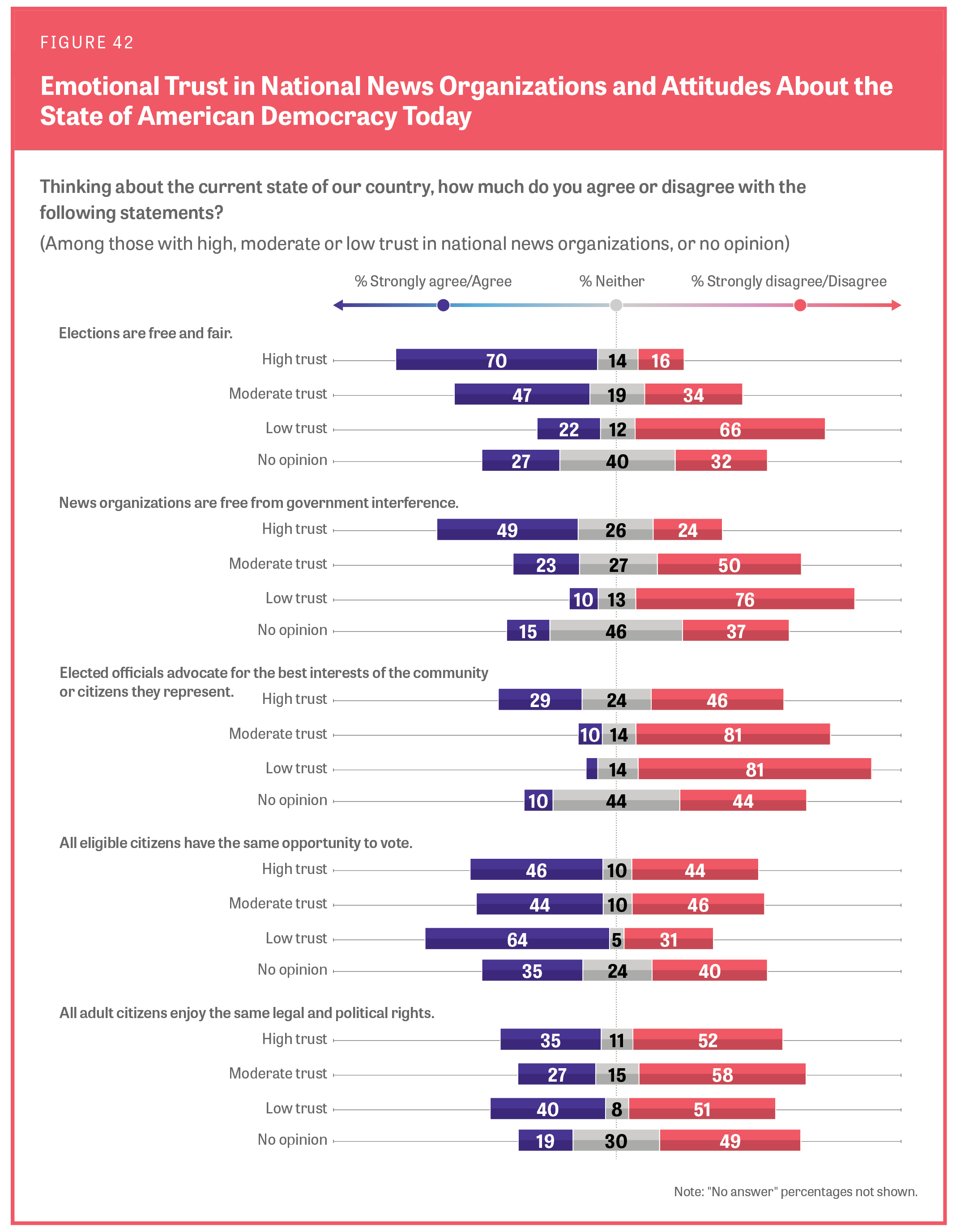OVERVIEW
Democracy in America relies on an independent press to inform citizens with accurate information. Yet today, two forces pose significant challenges to this function: the growing struggle of news organizations to maintain financial independence and the growing distrust of news among the public.
In Part 1 of the American Views 2022 report, Gallup and Knight Foundation offer insights into how Americans think about the motivations of news executives and how news is funded. Most believe that the news media put business needs ahead of serving the public. However, those who think news organizations balance civic purpose with corporate needs are more likely to have paid for news in the past and be willing to do so in the future. This finding suggests that the news media’s future financial sustainability ties directly to Americans’ perception that journalism organizations are fulfilling their democratic role in society.
Gallup and Knight have been tracking the decline of trust in the news media since 2017. Gallup’s long-term trend on this measure hit a record low in 2020, when the share of Americans with no confidence in the news media surpassed that of people with at least some confidence for the first time in 40 years.1 Furthermore, findings from the American Views 2020 report showed that Americans were “very concerned” about increasing political bias in news coverage and the perception that news organizations “push an agenda.”
Media trust continues to vary along predictable lines. Democrats express significantly more trust in news organizations than Republicans. Among Republicans, trust in news continues to decline. New data show that more independents today report distrusting news than ever previously reported. Yet, trust in local news organizations remains higher than trust in national news, as Gallup and Knight have consistently shown.2
The past five years of Gallup/Knight studies on this topic have focused mostly on the practices of news organizations linked to trust. For example, many Americans say they care about transparency, objectivity and accuracy. But if many news outlets already have high journalistic standards in place, why does trust continue to diminish overall? The focus of the American Views 2022 Part 2 report is to expand understanding of the emotional factors that drive attitudes about the news.
To be sure, distrust of information or institutions is not necessarily bad. Some skepticism may be beneficial in today’s media environment, where the number of information sources available feels infinite, advanced technology often makes it difficult to identify reliable information and journalists inevitably make mistakes in their reporting. But this study suggests that many Americans are not solely skeptical of news today — they feel distrust on an emotional level, believing news organizations intend to mislead them and are indifferent to the social and political impact of their reporting. Our analysis demonstrates that these indicators of emotional trust in news are, in fact, distinct from the opinion that news organizations are capable of delivering accurate and fair reporting.
Emotional trust is more deeply rooted and is especially important to understand in the context of the news media. This study shows that emotional trust has a strong relationship to perceptions and behaviors that could harm the critical, mutually beneficial relationship between the health of the press and the health of U.S. democracy. The more emotional trust Americans have in news, the more likely they are to say news organizations balance staying in business and serving the public well. The more emotional trust in news, the more empowered Americans feel to navigate a complex information environment. The more emotional trust in news, the more willing Americans are to pay for it. And, emotional trust in news is linked to Americans’ overall assessment of U.S. democracy.
The data presented here make a case for why the journalism industry should double down on efforts to rebuild the public’s trust — and how they can do it more effectively.
Executive Summary
1. A richer understanding of Americans’ declining trust in news
Negative sentiment about the news media has grown over time — particularly among independents.
- Only 26% of Americans have a favorable opinion of the news media, the lowest level Gallup and Knight have recorded in the past five years, while 53% hold an unfavorable view.
- Across all political affiliations, more Americans say they hold an unfavorable opinion of the news media compared to a survey conducted in late 2019-early 2020. This rise is especially pronounced among independents but is also apparent among Democrats — who typically hold more favorable views of the media.
- Perceptions of political bias in news coverage have also increased, with independents driving the trend, followed by Republicans, then Democrats.
- Young people continue to hold more negative perceptions of the news media than older generations, confirming previous findings.
Americans believe national news organizations are capable but not always well intentioned.
- While 72% say national news organizations have the resources and opportunity to report the news accurately and fairly to the public, only 35% say most national news organizations can be relied on to deliver the information they need.
- Thirty-five percent say most national news organizations care about how their reporting affects American society, culture and politics; fewer (23%) believe most national news organizations care about the best interests of their readers, viewers and listeners.
- Fifty percent of Americans feel most national news organizations intend to mislead, misinform or persuade the public.
In contrast, most Americans say local news organizations care about the impact of their reporting.
- Sixty-five percent report that local news organizations have the resources and opportunity to report the news accurately and fairly to the public, and more than half of Americans say most local news organizations can be relied on to deliver the information they need.
- Fifty-three percent believe most local news organizations care about how their reporting affects their community broadly, and 47% believe most local news organizations care about the best interests of their readers, viewers and listeners.
- Forty-four percent of Americans say local news organizations do not intend to mislead, misinform or persuade the public.
Emotional trust in news is driven by the belief that news organizations care, report with honest intentions and are reliable. More than twice as many Americans report high emotional trust in local news than in national news.
- Forty-four percent of Americans have high emotional trust in local news organizations, compared with 21% who have high emotional trust in national news organizations.
- The inverse is also true: Just 18% of Americans have low emotional trust in local news organizations, compared with 41% who have low trust in national news organizations.
2. Emotional trust and how Americans get their news
Americans who prefer to get their news online or from “other” sources outside of the 20 most-preferred news outlets exhibit lower levels of emotional trust in national news organizations.
- Nearly half (47%) of Americans who prefer to get most of their news online report low emotional trust in national news organizations, while only 15% report high emotional trust.
- In contrast, only 28% of Americans who prefer to get most of their news from television report low emotional trust in national news.
- Americans who get their news daily from television are 10 points more likely to report high emotional trust in national news than those who get news daily from websites or social media.
- The relationship between getting news mostly online and lower emotional trust in national news could be related to age, as the youngest generations of Americans are the highest consumers of online news and report the lowest emotional trust in national news organizations.
- Forty-five percent of Americans who name a cable news outlet (CNN, Fox News or MSNBC) as their top news source exhibit low emotional trust in national news organizations overall; only 19% report high emotional trust.
- Network news consumers are more trusting of news. Only 17% percent of those who turn most often to U.S. network news outlets (ABC, CBS or NBC) report low emotional trust in national news organizations, while 37% report high trust.
- Of U.S. adults who turn to news sources outside of the top 20 most-commonly used in America, 70% exhibit low emotional trust in national news organizations, while only 5% of these news consumers report high emotional trust.
3. Emotional trust and news: A deeper look
Trust and the ability to navigate today’s information environment
Half or more of Americans report difficulty in sorting out facts and being well-informed.
- Americans’ feelings of being overwhelmed by today’s information environment hold steady.
- Sixty-one percent say the increase in information today makes it harder to be well-informed.
- Fifty percent say there is so much bias in the news media that it is often difficult to sort out the facts.
Low emotional trust in national news is associated with feeling unable to sort out facts or be well-informed.
- Eighty-four percent of Americans with high emotional trust in national news organizations report that although there is some bias in the news, there are enough sources to sort out the facts; only 22% of those with low emotional trust in national news feel this way.
- Seventy-six percent of Americans with low emotional trust in national news organizations say the increase in information available today makes it harder to be well-informed, while 60% of those with high emotional trust in news say it makes being well-informed easier.
Trust, motives of news organizations and paying for news
Americans with higher emotional trust in news are more likely to think news organizations balance business
success with civic purpose.
- Ninety percent of Americans with low emotional trust in national news feel most news organizations prioritize financial interests over the public interest.
- Sixty-one percent of those with high emotional trust say most news organizations balance staying in business with serving the public well, while 22% say news organizations mainly prioritize staying in business, and 15% say they mainly prioritize providing a public service.
The tangible cost of low trust
The more emotional trust Americans have in news organizations, the more willing they are to pay for news in the future.
- Thirty-five percent of Americans with high emotional trust in national news have paid for news in the past, and 25% say they would pay for news in the future.
- In contrast, 23% of Americans with low emotional trust in national news have paid for news; 13% say they would pay for news in the future.
- Similar patterns emerge for local news: Higher emotional trust in local news is related to a higher likelihood of having paid for news and willingness to do so in the future.
- If Americans perceive that local news organizations do not have the resources and opportunity to report the news accurately and fairly, they are more likely to say they would consider paying for news in the future.
- This finding does not hold for national news organizations.
4. Emotional trust, media and democracy
Americans with low emotional trust in national news are more doubtful of the political process and the opinions of experts.
- Seventy-one percent of those with low emotional trust in national news organizations believe that the people who really “run” the country are unknown to the voters; only 46% of those with high trust believe this.
- Most Americans with low emotional trust in national news organizations think official government accounts of events cannot be trusted (65%), while only 22% of those with high trust say so.
- Americans with lower emotional trust in national news are much less likely to value the opinions of experts than those with high emotional trust.
Low emotional trust in national news is associated with feeling unable to sort out facts or be well-informed.
- While 70% of Americans with high emotional trust in national news organizations believe elections are free and fair, just 22% of those with low emotional trust say the same.
- Twenty-nine percent of Americans who have high emotional trust in national news organizations say elected officials have their constituents’ best interests in mind, compared with just 4% of those with low emotional trust.
- Those with low emotional trust in national news are much more likely to believe the government interferes with news organizations’ reporting than Americans with high trust.

